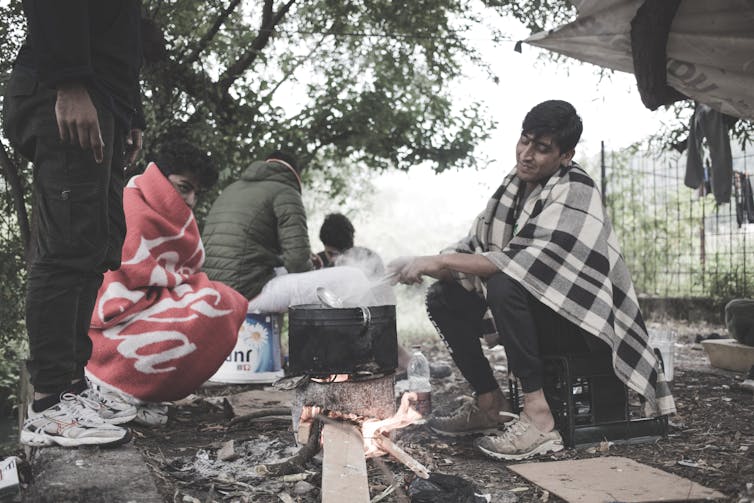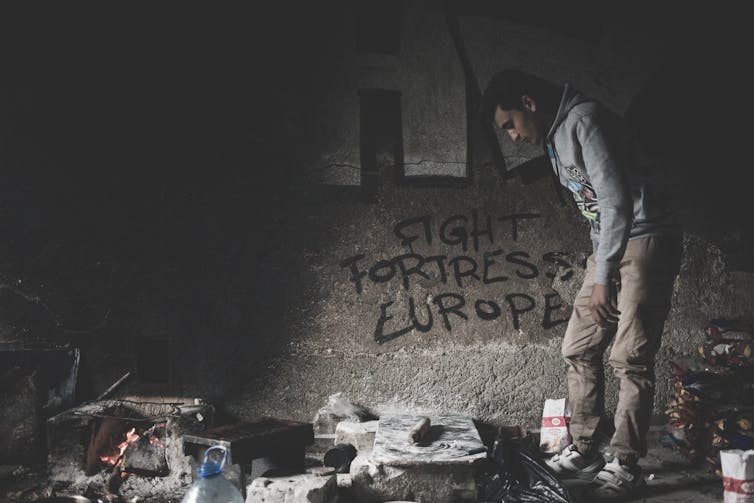Alessandra Fuccillo, CC BY-ND
As the Taliban closed in on Afghanistan, the European Union co-signed a joint statement with dozens of nations agreeing that “the Afghan people deserve to live in safety, security and dignity” and that the international community was “ready to assist them”.
As someone who has been researching the refugee crisis on Europe’s borders for years, I found the statement surprising. Before it was making bold statements about events in Kabul, the EU had spent years failing to help thousands of Afghans seeking help at its borders.
Since 2015, more than 570,000 Afghan citizens have sought protection in the EU. Thousands of them remain stuck in Bosnia and Herzegovina, after having been pushed back by the Croatian police catching them on the EU border.
Bosnia and Herzegovina is not a member of the EU, nor of the Schengen area, so only a small number of migrants apply for asylum there. A large majority try to move forward – to pass through in order to reach EU countries where they have a better chance of obtaining asylum.
For four years, migrants attempting to cross the Bosnian-Croatian border have been sent back by Croatian police forces. The European Center for Constitutional and Human Rights defines pushbacks as “a set of state measures by which refugees and migrants are forced back over a border – generally immediately after they crossed it – without consideration of their individual circumstances and without any possibility to apply for asylum or to put forward arguments against the measures taken”. Pushbacks violate – among other laws – the prohibition of collective expulsions stipulated in the European Convention on Human Rights, which defines collective expulsion as “any measure compelling aliens, as a group, to leave a country, except where such a measure is taken on the basis of a reasonable and objective examination of the particular case of each individual alien of the group”.
The Border Violence Monitoring Network recorded 110 testimonies of pushbacks affecting 1,656 people in 2020 alone. In almost 90% of the cases, witnesses reported some form of degrading treatment or torture.

Alessandra Fuccillo, CC BY-ND
Afghans arrive at this border alongside Syrian, Iranian, Iraqi and Pakistani refugees. From Bosnia, they attempt the so-called “game”. Refugees use this expression to describe the attempt to cross a border on foot. The “game” consists of days and nights walking in the woods that connect national frontiers. It takes at least 20 days to travel from the Bosnian border to Italy. The “game” is “played” against the border and against the police. They face low temperatures, wild animals and food and water shortage on one hand, the fear of police pushbacks on the other.
Several told us the police have taken their phones, shoes and money. Others have reported violence.
Testimony from the border
Amir has been travelling for five years. He left Afghanistan when the Taliban invaded his village. He went to Turkey where he worked for three years in a factory. When his temporary papers expired, he was afraid of being deported and continued his journey into Bosnia. “I have been stuck in Bosnia for nine months. I have tried the game 27 times and I am still here,” he told me.
The majority of those who remain blocked in Bosnia and Herzegovina stay in the so-called “jungle camps” scattered around the provincial roads that connect the cities of Bihac, Cazin and Velika Kladuša, or in the International Organization for Migration’s temporary reception centres. They live in awful conditions, far away from urban centres, often with no access to running water or electricity.
With each deportation, migrants have to regroup to find money and resources. Most of them are financially assisted by relatives in their home countries. But in the last month, many Afghan migrants have lost contact with their families.
Ali, a 26-year-old man from Kabul told us that he has not been able to talk to his dad:
My dad lives alone in Kabul. He did not like the Taliban and now I don’t know what happened to him. The Croatian police stole my phone, and I don’t have the money to buy another one and cannot ask him to send it. I don’t even know if he is alive.
Ali is not the only one who has not been able to contact his family. The physical and psychological stress of squatting and deportation mixes with the anxiety generated by the events that are taking place in Afghanistan.

Alessandra Fuccillo, CC BY-ND
There are around 15 Afghan families living between the villages of Bojina and Sturlic, right on the Bosnian border. They have found shelter in the ruins of houses abandoned after the Bosnian war. Kala, a 17-year-old girl from Kabul has been travelling for four years with her mother and her younger brother. They have been stuck in Bosnia for nine months. She said:
During the last game, they even took our jackets and our backpacks. My brother was left in the rain with only a t-shirt. In the backpack there were my mom’s medicines. She is very ill and she needs them but they did not care and now she does not have them anymore.
Kala told us that the police had started being violent with women. “They use tasers on our necks to make us fall down,” she said. “They use sticks against us even if we surrender. Usually, it is a female officer to beat the women, but sometimes they even use dogs against us.” Sana, another girl travelling with her family, showed us dog bite marks on her leg and told us the police set dogs on her and her mother.
The stories of these people living in limbo at the border remind us that the Afghan crisis, while currently acute, is not new and is not far away. The EU’s indignation over what is happening in Afghanistan rings hollow when contextualised with the consistent unwillingness to address the situation in its own neighbourhood.
![]()
Benedetta Zocchi receives funding from Leverhulme Trust











